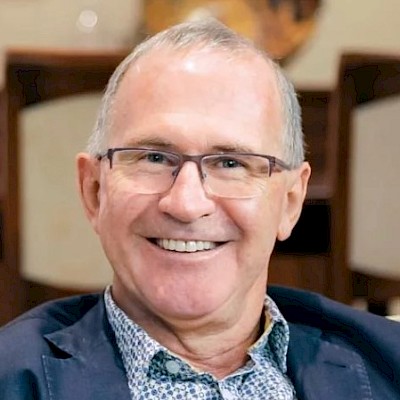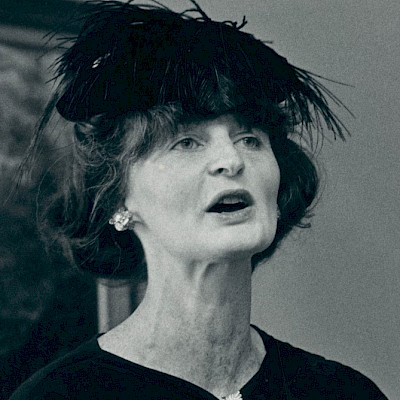Joan Cushing, a fixture of the Washington theatrical scene who entertained audiences of all ages, first as the plume-hatted Mrs. Foggybottom in a long-running political satire revue and later as a nationally known creator of plays for children, died May 21 at a care facility in Columbia, Md. She was 77.
Her family confirmed her death and said she had Parkinson’s disease.
Ms. Cushing, a onetime schoolteacher, began her performing career at Washington-area piano bars and burst to fame as Mrs. Foggybottom, a character she conjured up to amuse bar patrons in between show tunes and standards.
Named for the neighborhood of Washington that is home to the State Department, the Watergate complex and George Washington University, Mrs. Foggybottom was a martini-sipping dowager — one of “those ladies who lunch,” as Ms. Cushing described her.
In the persona of her alter ego, Ms. Cushing skewered the city’s grandees in a cabaret-style show, “Mrs. Foggybottom and Friends,” that opened in 1986 at the New Playwrights’ Theatre, played for nearly a decade at the Omni Shoreham Hotel, appeared at the Hexagon charity revue — where Ms. Cushing was a regular — and also went on the road.
“Political satire has an essential role in this town,” Ms. Cushing told the Washington Times in 1995. “People do take themselves too seriously.”
She joined several acts in Washington, among them the Capitol Steps and Gross National Product, that delivered sendups of politicos, wonks, VIPs and wannabe VIPs in a mixture of stand-up and song. Mark Russell, perhaps Washington’s best known musical parodist, once declared of Ms. Cushing that “she has more dignity than I do.”
Her number “The Deficit Shuffle” incongruously had U.S. Sens. Phil Gramm (R-Tex.), Warren B. Rudman (R-N.H.) and Ernest F. “Fritz” Hollings (D-S.C.), authors of the Gramm-Rudman-Hollings balanced budget act of 1985, singing in rap.
Mrs. Foggybottom mounted her own campaign for the presidency on the Cocktail Party ticket. She pledged, if elected, to ensure that every American could correctly spell “hors d’oeuvres.”
In addition to her stage performances, Ms. Cushing penned a satirical column that appeared in the Capitol Hill publication Roll Call and in the Georgetowner newspaper.
She had never written for children, however, when Imagination Stage, then located at the old White Flint Mall in suburban Montgomery County, Md., commissioned her in 2001 to write a musical based on the book “Miss Nelson Is Missing!” (1977) by Harry Allard with illustrations by James Marshall.
Kathryn Chase Bryer, the director of theater at Imagination Stage, said that she and her colleagues admired the cleverness of Ms. Cushing’s lyrics for Mrs. Foggybottom and did not see her lack of experience in theater for young people as a limitation.
Ms. Cushing was a gifted storyteller, Bryer said, and the principles of storytelling are the same, whether the audience is made up of grown-ups or children. “When you’re a child you care about things passionately,” Bryer said. “They just happen to be different things than what you care about when you’re an adult.”
“Miss Nelson Is Missing!” — about a schoolteacher, her class and the dreaded substitute Viola Swamp — became one of the most popular musicals for children. (It is currently playing again at Imagination Stage, now located in Bethesda, Md.)
From that point on, Ms. Cushing devoted her career in large part to young audiences. Her works became mainstays of Imagination Stage, the Adventure Theatre at Glen Echo in Washington and other children’s theaters around the country.
She followed “Miss Nelson Is Missing!” with “Miss Nelson Has a Field Day” and brought author Barbara Park’s popular character Junie B. Jones to stage in “Junie B. Jones and a Little Monkey Business.”
Ms. Cushing’s play “Petite Rouge,” based on a book by Mike Artell with illustrations by Jim Harris, is a Cajun retelling of the Little Red Riding Hood fairy tale, and “Ella’s Big Chance,” adapted from a book by Shirley Hughes, sets Cinderella in the Jazz Age.
Ms. Cushing’s play “Grace for President,” based on a book by Kelly DiPucchio and LeUyen Pham, centers on an African American girl who runs for president in a mock election at her school. It remains one of Ms. Cushing’s most popular works, according to her agent, Susan Gurman.
Joan Marie Cushing was born in Evanston, Ill., on Aug. 18, 1946. Her father was a physicist, and her mother was a Montessori teacher who raised Ms. Cushing and her seven siblings.
Ms. Cushing grew up in Winnetka, Ill., outside Chicago, before moving at age 13 to Kensington, Md., a suburb of Washington. She had years of classical music training and graduated from the Academy of the Holy Cross, an all-girls Catholic school in Kensington, in 1964. She was a 1970 elementary education graduate of the University of Maryland.
Ms. Cushing taught elementary school while moonlighting as a piano player at Washington-area bars and restaurants, including Mr. Smith’s in Georgetown and the Fire Escape Lounge in Alexandria, Va., where Mrs. Foggybottom made her debut. “One day,” Ms. Cushing told The Washington Post, “I decided that playing piano was more fun” than teaching.
Her husband, Paul Buchbinder, died in 2010 after 25 years of marriage. Survivors include a son, Ben Buchbinder of New Orleans; a stepson, Chris Buchbinder of Mill Valley, Calif.; a son from a previous relationship, Patrick Lavelle of Lafitte, La.; a sister; six brothers; and four grandchildren.
Ms. Cushing was a longtime District resident and belonged to Holy Trinity Catholic Church in Georgetown.
She wrote several plays for adults, including “Flush!,” set in a restroom at a venue that is hosting both a wedding and a funeral; “Tussaud,” about the French wax sculptor Marie Tussaud; and “Breast in Show,” a musical about the experience of breast cancer.
But her works for young people were perhaps the most enduring, if only because the collective audience of children is continually renewed.
“When I write, I don’t write for kids,” Ms. Cushing told the Nashville Tennessean. “I just write. I know in my head that a kid audience will see it, but I try not to think about that. When I was growing up, we didn’t go to children’s musicals. We just went to Broadway. And no, we didn’t get everything, but we still had a great time. Sometimes, with children’s musicals, there can be a very simple story on the surface, but another level underneath.”





